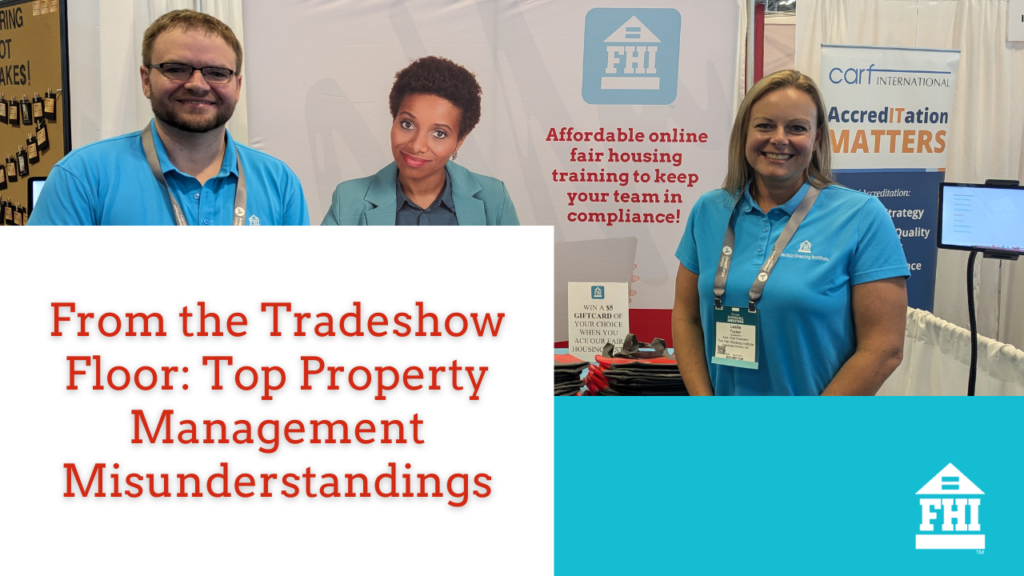Navigating fair housing laws can be challenging, but avoiding common misunderstandings is crucial for property managers who want to protect their communities and their careers. These laws are designed to ensure everyone has equal access to housing opportunities, but myths and outdated practices can lead even well-meaning professionals astray.
After connecting with property managers across the country, we’ve identified five top property management misunderstandings. Let’s dive into these misconceptions and how to handle them correctly.

Table of Contents
1. Thinking ESAs Are Limited to Dogs
It’s a common belief that Emotional Support Animals (ESAs) are limited to dogs. The truth? ESAs can be almost any domesticated animal, from cats and rabbits to miniature horses and even birds. While you probably won’t encounter requests for grizzly bears, dismissing certain species outright can land you in trouble.
Property managers must evaluate each ESA request individually through the reasonable accommodation process. Blanket policies that deny certain breeds or species are not compliant with fair housing laws. Remember, the focus is on the tenant’s documented need for the animal—not whether it’s a conventional pet.
2. Assuming Maintenance Staff Don’t Need Fair Housing Training
Fair housing training is often associated with leasing or management teams, but maintenance staff are equally critical. Maintenance professionals interact with residents daily—whether entering units for repairs, responding to service requests, or working in shared spaces. These interactions can lead to unintentional fair housing violations if staff aren’t properly trained.
In fact, maintenance records and actions are often central in fair housing cases. By ensuring your entire team, including maintenance, understands fair housing laws, you reduce risks and foster a culture of compliance throughout your property.
3. Believing “Once Trained, Always Compliant”
Some property managers believe that once their team has been trained in fair housing, they’re set for life. Unfortunately, this isn’t the case. Fair housing laws evolve, as do enforcement trends and industry best practices. Training that was relevant five years ago might not adequately address today’s challenges.
While there’s no legal mandate for how often training should occur, annual training has become the industry standard. For new hires, training within the first 30 days is strongly recommended. Regular updates help your team stay sharp and prepared to navigate a constantly changing regulatory environment.
4. Over-Verifying Accommodation Requests
Another common misunderstanding involves the verification process for reasonable accommodation requests. Many property managers mistakenly believe they must verify every request with a letter from a healthcare provider. However, if the tenant’s disability or need for accommodation is obvious or already well-documented, additional verification is unnecessary.
For example, if a resident uses a wheelchair, there’s no need to request further proof of their disability. Requiring excessive documentation not only violates fair housing laws but also erodes trust between management and residents. Always handle verification requests on a case-by-case basis to ensure compliance.
5. Requiring the Use of Company Forms
Using forms for accommodation requests is a good practice—it helps streamline the process and ensures you collect all necessary information. However, requiring tenants to use your specific forms is a violation of fair housing laws. If a tenant provides equivalent documentation, such as a letter from a healthcare provider, you are required to accept it.
The key is to focus on the information itself, not the format. Rigidly enforcing the use of company forms can lead to legal challenges and damage your reputation. Be flexible and prioritize proper documentation over bureaucratic processes.
Staying Ahead in Fair Housing Compliance
Fair housing compliance is an ongoing commitment, not a one-time task. By addressing these common misconceptions, you can build trust with your residents, protect your property, and reduce your legal risks.
Whether it’s training your team more frequently, handling accommodation requests with care, or adapting to evolving industry norms, proactive efforts go a long way. Fair housing laws may seem daunting, but with the right approach, you can confidently navigate them and create a community where everyone feels welcome.
You might also be interested in:
- Preventing Staff Harassment in Property Management
- Fair Housing Liability: When Does Resident-on-Resident Harassment Trigger Management’s Duty to Act?
- Retaliation vs. Rule Enforcement: Navigating the Fair Housing Fine Line
- Top 3 Fair Housing Risks for Property Managers in 2026
- A Year of Upheaval: How 2025 Impacted Fair Housing Operations
